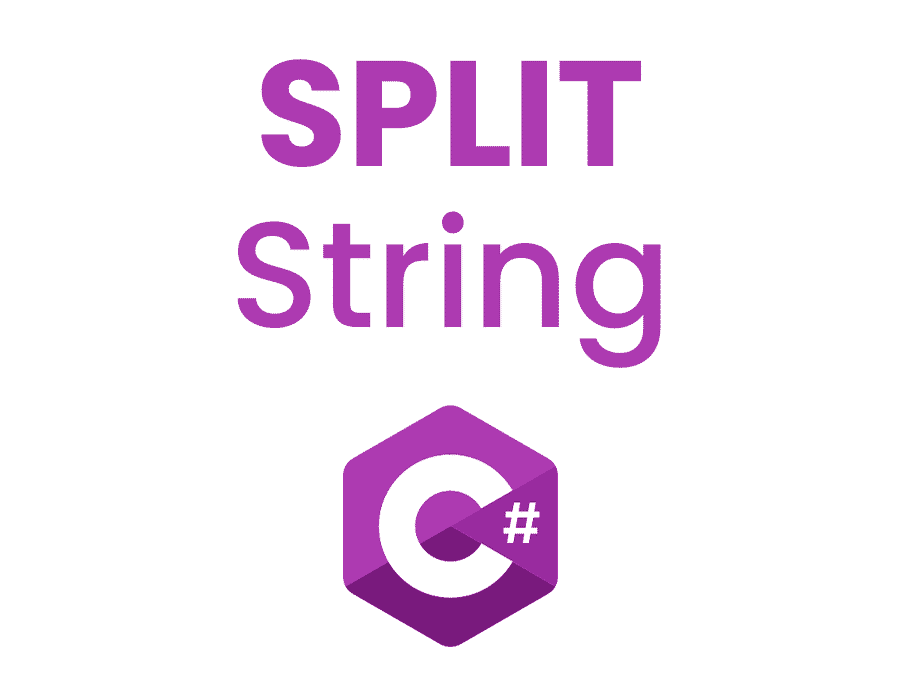How To Split String In C# (Basic & Advanced Tutorial)

Introduction to Splitting Strings in C#
Splitting strings in C# is a crucial task when manipulating text in your programs. The ability to split strings can help you organize your data, create better-performing code, and enhance the readability of your programs. In this article, we will explore the various techniques and examples to help you become a string splitting expert in C#.
Understanding the C# String.Split Method
The String.Split method in C# is a powerful and versatile tool used for dividing strings based on specified delimiters. This method relies on delimiter characters to break a string into a string array, producing smaller substrings as a result.
Reasons for Splitting Strings in C#
Splitting strings in C# can be handy for different scenarios such as:
- Processing large text files
- Parsing command-line arguments
- Extracting necessary information from data sources
- Converting input strings into various data types for further processing
C# Split String Basics
Before diving into detailed examples, let’s first understand some key concepts related to splitting strings in C#. Covering the fundamental aspects of string splitting will make more advanced topics easier to comprehend.
C# Split by String: Key Concepts
When using the String.Split method to divide a string, you need to specify a delimiter that acts as a separator. The delimiter could be:
- A single character, e.g., a space, comma, or colon
- A string containing multiple characters, e.g., “||” or “–>”
- An array of characters, e.g., a combination of space, comma, and semicolon
The delimiter(s) essentially guide the Split method on how to break the string into smaller substrings. The resulting substrings are then returned as an array of strings. Here are some crucial points on string splitting in C#:
- The
Splitmethod does not include the delimiters in the resulting substrings. - If the specified delimiter does not exist in the string, the
Splitmethod will return an array containing only the original input string. - The
Splitmethod is case-sensitive. For instance, splitting a string using “A” will not split on any occurrences of “a.”
String Split C Sharp: The Importance of Delimiters
Delimiters play a crucial role while splitting a string, as they help identify where the string should be divided. Selecting the right delimiter(s) can impact the results and determine the accuracy of string splitting. For example:
- Choosing space as the delimiter will split the string at every space character, which is suitable when breaking a text into words.
- Using the newline character (e.g., ‘\n’ or
Environment.NewLine) as the delimiter is appropriate when splitting a multiline string into separate lines. - When parsing CSV data, a comma delimiter can be effective at separating individual values in the data.
In any situation, always evaluate the most appropriate delimiter(s) to meet the specific requirements of your program.
C# Split String by Character: Simplicity vs Flexibility
When splitting a string by a single character, C# allows you to use simple syntax. However, splitting strings based on multiple characters or more complex conditions might require a more advanced syntax involving character arrays or string arrays.
Here are some examples that illustrate the difference between simple and complex string splitting scenarios:
Simple case – Splitting by a single character:
Loading code snippet...
Output:
Loading code snippet...
Complex case – Splitting by multiple characters:
Loading code snippet...
Output:
Loading code snippet...
When splitting strings in C#, it’s essential to understand the trade-offs between simplicity and flexibility. While simple syntax might be easier to use and read, it may not cover complex, real-world scenarios.
On the other hand, more advanced syntax allows you to handle various conditions, but could introduce complexity in your code.
Always evaluate the requirements of your application and choose the most suitable approach for splitting strings.
String Split C# Examples and Techniques
Now that we know the basics, let’s dive into actual examples and techniques for splitting strings in C#.
C# Split String Example: Basic String Splitting
Here’s a simple example of how to split a string using a space character as the delimiter:
Loading code snippet...
The output for the above code will be:
Loading code snippet...
C# Split a String: Advanced Use Cases
There are many advanced use cases when splitting strings such as working with multiple delimiters and handling newlines and whitespaces.
Splitting String with Multiple Delimiters
To split a string with multiple delimiters, you can use a character array or a string array. The following example demonstrates splitting a string using two delimiters – a comma and a semicolon:
Loading code snippet...
The output for this code will be:
Loading code snippet...
C# Line Split: Handling Newlines and Whitespace
In some situations, you might need to split a string based on line breaks and whitespace. You can achieve this using the Environment.NewLine constant:
Loading code snippet...
The output for this code will be:
Loading code snippet...
C# Split Array: Working with Arrays
Splitting arrays is also possible in C# using the Split method. Let’s illustrate this with an example using a one-dimensional array:
Loading code snippet...
Output:
Loading code snippet...
String Split CSharp: Improved Performance Tips
When working with large strings or performance-critical applications, optimizing the Split method usage can lead to significant performance improvements. Some options include:
- Using
string.Trim()to remove leading or trailing whitespace before splitting - Utilizing
Span<T>orMemory<T>to reduce memory allocations
C# Split String Into List
Splitting a string in C# can be done directly into a List<string> instead of an array, offering more flexibility to manipulate the results.
C# String Split to List: List vs Array Benefits
Converting the string split results directly into a List can be beneficial as it provides features like dynamic resizing, improved search functionality, and easier manipulations.
C Sharp Split String: Creating Custom String Splitter Methods
Creating custom string splitting methods can provide more control and better performance in certain cases. For example, you could create a helper method to split a string into a list:
Loading code snippet...
With the custom method, you can split a string directly into a list:
Loading code snippet...
Output:
Loading code snippet...
C# Split Function: In-Depth Analysis
Understanding the various overloads and options of the String.Split method can open new possibilities and improve your code efficiency. In this section, we will delve deeper into the overloads, options, and real-life examples to provide a comprehensive understanding of the C# Split function.
Split C#: Understanding Overloads and Options
The .NET Framework provides several overloads for the String.Split method, allowing for different combinations of delimiters and splitting options. Some of the most common overloads and options include:
Split by a single character:
Loading code snippet...
Output:
Loading code snippet...
Split by multiple characters (char array):
Loading code snippet...
Output:
Loading code snippet...
Split by multiple characters (string array):
Loading code snippet...
Output:
Loading code snippet...
Split by StringSplitOptions:
None: Retains all entries, even if they are empty.RemoveEmptyEntries: Excludes any empty entries from the result.TrimEntries(available in .NET 6): Trims whitespace characters from the beginning and end of each entry.
Loading code snippet...
Output:
Loading code snippet...
These overloads and options can be combined as needed to handle various scenarios, providing greater control over the string splitting process.
Array Split C#: Splitting Strings into Multidimensional Arrays
In certain cases, you may want to split strings into multidimensional arrays, such as when working with a table structure. Although the Split method doesn’t support this directly, you can achieve this with a combination of loops and additional logic:
Loading code snippet...
Output:
Loading code snippet...
This approach lets you build and manipulate multidimensional arrays based on the input string’s structure.
C# String Split Example: Handling Null or Empty Delimiters
Passing a null or empty delimiter to the Split method defaults to using whitespace characters as the delimiter. However, in situations where this behavior is undesired or not applicable, you can explore alternative approaches such as using RegexOptions.
Consider the following example, where we use a regular expression to split a string based on a pattern of one or more whitespaces:
Loading code snippet...
Output:
Loading code snippet...
By employing regular expressions, we can control the splitting behavior with more precision, overcoming any limitations that might arise from using null or empty delimiters with the Split method.
Tips and Tricks for Splitting Strings in C#
Expanding your string splitting knowledge with additional techniques will help you tackle even more complex scenarios and improve your overall programming efficiency.
String Splitter C#: Dealing with Unicode Characters
When dealing with Unicode characters, you can use the Split method similarly as with regular characters. Just ensure the delimiter is in the correct Unicode format. Here’s an example:
Loading code snippet...
Output:
Loading code snippet...
Split Text in C#: Stream and File Handling
Splitting large text files or streams efficiently is crucial for performance and resource management. Utilizing StreamReader, you can read and split lines directly from a file without loading the entire content into memory:
Loading code snippet...
Split String After Specific Character C#: Advanced Techniques
In some cases, you may need to split a string only after a particular character. One approach is to use the IndexOf method to find the position of the character and then split the string based on that position. Here’s an example:
Loading code snippet...
Output:
Loading code snippet...
Conclusion: Mastering How to Split String in C#
Having explored various techniques and examples, you’re now well-equipped to split strings in C# like a pro. From basic to advanced use cases, understanding the Split method and its various options can help you manipulate text data efficiently.
C# Split String On Space: Best Practices for Readability
As a general rule, splitting strings on space can lead to better readability of your code. However, always consider the context and use the most suitable delimiter(s) for your specific scenario.
Split Function in C#: Important Notes and Pitfalls
One caveat when using the Split method is to be careful with the delimiters and overloads, as incorrect parameters can lead to undesired behavior or unpredictable results. Always test your code thoroughly with both expected and unexpected input values!
String Split to Array: Choosing the Right Data Structure for Your Needs
When working with split strings, it’s essential to choose the most suitable data structure based on your application’s requirements. Be it an array, list, or a more complex data structure, always consider factors like performance, memory usage, and ease of manipulation before making the final decision. Happy splitting!





